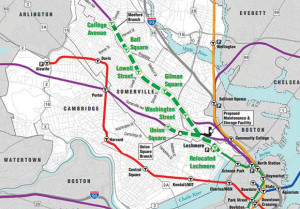By Haley ED Houseman
Plagued with enormous cost overruns and questions about feasibility, the MBTA Green Line Extension Project (GLX) now faces possible abandonment and loss of the previously allocated federal financial aid. The project is legally mandated as a way to offset air quality concerns centered on the effects of the Big Dig, and was intended to be implemented by 2011.
Facing a break in trust with the public, and the loss of nearly a billion in federal aid, the MBTA is looking at plans to reduce costs, cut proposed services, or even cancel the project entirely. Ongoing roadblocks to its implementation have come to the forefront most recently in a scathing study conducted by the Berkeley Research Group.
In August, it was estimated the project would cost $3 billion to complete the project, $2 billion more than the original cost estimate. The Berkeley Research Group (BRG) conducted a study of the GLX project after projected cost rose so sharply. The study found that the project management by the MBTA and its contractors failed to properly implement the particular combined design and construction plan that was passed by the state legislature, resulting in a lack of oversight and rapidly rising costs. This procedural model is being used for the first time in Massachusetts. Called “Construction Manager/General Contractor” project delivery model, it’s designed to shift risk to the contractor and away from the MBTA, but the process backfired due to poor implementation.
Noting in a presentation on December 2 to the MassDOT Board of Directors, which oversee the Department of Transportation and the MBTA, the research group found the project progress was “excessively schedule driven,” which in part caused a major failing of the implementation of the agreed-upon process. The GLX project was also affected by absence of a properly secured budget, something one of the research group’s leaders Terry Yeager said the T should have produced in 2012. According to the report, a reliable budget has yet been produced. Other issues called out by report was that the MBTA involved minimal amounts of its staffers in the process — just four — effectively disengaging from the collaborative process and missing an opportunity to gain institutional knowledge of the process and effectively track the project.
These issues were caused in part by the bidding, which despite the CM/GC process, allowed the group of primary contractors working on the project, White Skanska Kiewit (WSK), to qualify its multiple bids. In the presentation, it was noted that the contractors worked the system to their advantage, and allowed WSK obtain the highest payment possible for the contracts. One of the key problems BRG found with the MBTA’s procurement process for the Green Line extension is that it did not allow the agency to review accounting or limit indirect costs.
Governor Baker, commenting on the situation on WBUR, is concerned about the needs of MBTA riders in general, and the need to balance the investments the MBTA is making in service. Says the governor, “I’m not going to be comfortable stealing, borrowing, taking hundreds of millions of dollars out of the investments we need to make in a system that serves a million people for a spur. It’s an important spur, and I support the project at a certain price…[We] need to put some serious money into it—and we are.”
Last week, officials unanimously approved a resolution calling for a redesign and new cost estimate for a reduced plan to determine whether or not the project will move forward, expect in the spring. Commonwealth magazine has reported the MBTA is planning on suing the contractors involved in the Green Line Extension. The four contracts to WSK have been terminated and the department is actively searching for a new project manager. To prevent any GLX-related spending, the Fiscal and Management Control Board voted to take over administration of the project from MBTA staff for at least 90 days. MASSDOT Secretary of Transportation Stephanie Pollack has noted that a process to rectify the many missteps doesn’t not rule out cancelling the project altogether if costs cannot be brought under control.
With the new $3 billion cost estimate, the Green Line Extension is set to be the most expensive rail extension project in the country per mile, according to federal data presented to the MassDOT and MBTA boards. The 4.7 mile project running through Somerville and Medford would serve one of the most populous areas of New England, and expects heavy usage. Though plagued with issues, the project also is generally politically supported. It is planned to run along existing rail right-of-ways, and has already acquired almost $1 billion in federal funding. The original plans for the extension called for the 2017 opening of two new stops in Somerville, plus a relocated Lechmere station in East Cambridge.
















Reader Comments